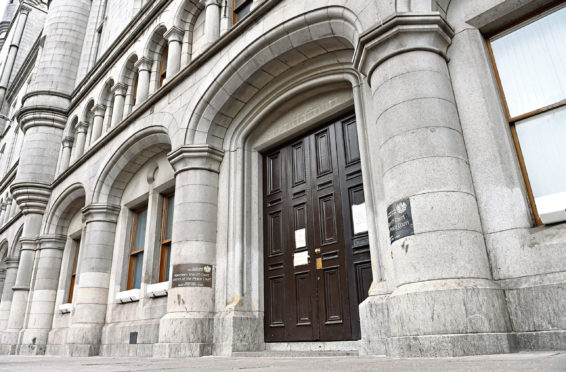A leading Aberdeen solicitor has criticised a new measure being introduced to try and tackle the court backlog, branding it a “pointless exercise”.
The Lord Justice General, Lord Carloway, has issued new guidance with the goal of reducing the backlog of summary cases, while ensuring physical distancing in courts.
From December 1 new meetings will take place outwith the courtroom between the prosecution and the defence ahead of pre-trial hearings.
The pre-intermediate diet meetings (PIDMs) are hoped to cut the number of cases that are continued to trial unnecessarily and which resolve on the day of trial or require to be put off, meaning witnesses attend court for no reason.
The PIDMs are being introduced following a pilot of the scheme in South Strathclyde, Dumfries and Galloway (Ayr, Airdrie, Dumfries, Hamilton, Lanark, Stranraer).
However Stuart Murray, the president of the Aberdeen Bar Association, branded the move a “pointless exercise” and said it may even create further delays.
He said: “In recent months, there has been a general shift towards increasing the workload for criminal defence solicitors, without a commensurate increase in funding from the Scottish Legal Aid Board.
“This week’s practice note from the Lord President comes into force on December 1 2020 and seeks to regulate to a greater degree, the preparation for trial by both the prosecution and defence.
“I can see the merit in doing that but I have significant concerns that the proposed new practice is simply unrealistic.
“It seeks to force the prosecution and the defence to reach early agreement on how a prosecution will proceed without taking into account the often challenging circumstances, in obtaining full instruction from clients.
“Those clients that are often vulnerable and are regularly dealing with other issues in their lives.
“Historically, the calling in court of an intermediate diet and the presence of the accused provided a focal point for all parties and an opportunity for the defence solicitor to take instruction from the client.
“The practice note seeks to reduce the number of intermediate diets and in so doing may well create further delay.
“I appreciate the need for social distancing in the current pandemic but as we move towards a possible and viable vaccine, this seems to be another case of the Scottish Courts and Tribunals Service doing too little too late.
“This seems to me to be a pointless exercise.”
Announcing the practice note, Lord Carloway said: “In light of the backlog of cases which has built up as a result of Covid-19 restrictions, it is vital to the efficient operation of the courts that valuable trial diets are not lost by last minute adjournments or late guilty pleas.
“Not only will early engagement improve the efficiency of the courts, it will also prevent witnesses and complainers from attending trials unnecessarily. Minimising physical contact with others in sheriff courts will reduce the risk of spreading coronavirus.
“The practice note was drafted following consultation with the Law Society of Scotland and the Crown Office and Procurator Fiscal Service. They are to be thanked for their valuable contributions. Such collaborative work is helping to ensure that justice is delivered in Scotland as efficiently as possible within a safe environment.
“The progress that is being made, to adapt to the challenging circumstances which we currently face, will serve our justice system well into the future.”
Ayr-based solicitor Peter Lockhart, who represented the Law Society in the pilot for the pre-intermediate diet meetings, said the initiative would benefit “all involved”.
He said: “It’s to try and resolve a number of cases. The last thing we want is witnesses, particularly during a pandemic, being brought to court, using public transport and potentially placing themselves at a health risk, and then finding that a trial doesn’t go ahead.
“I’m not saying this practice note is absolutely perfect. I’m hopeful and think it will certainly make a difference. If there are things that need to be tweaked we will tweak them.
“When you actually read the practice note and see the video that’s been issued, we’re going to have a question and answer session, I think most people will realise this is probably a step in the right direction.
“It will be a benefit really to all involved.”
A Judicial Office for Scotland spokeswoman said: “The practice note was drafted following consultation with the Law Society of Scotland, and the Crown Office and Procurator Fiscal Service. It is based on a successful pilot in the South Strathclyde Dumfries & Galloway Sheriffdom where it is supported by the local solicitors who took part.
“It is essential for all involved in court hearings, including witnesses as well as the accused, that justice is delivered and the practice note provides a structured process for what should already be happening as a matter of good practice.
“In terms of the Coronavirus Act 2020, the accused is not required to attend any diet other than a trial diet, and this guidance will decrease the footfall of participants in court buildings, reducing the risk of spreading coronavirus.
“It is designed to provide an effective procedure that places a minimal burden on solicitors.
“Several Q&A sessions are being held for practitioners where direct feedback will be welcomed and all solicitors are encouraged to attend.
“The current pandemic has presented very challenging circumstances, and the courts are working extremely hard to deliver justice in an environment that is safe for all participants.”
The Lord Advocate, James Wolffe QC, said: “Since the coronavirus pandemic began, the COPFS has been working closely with criminal justice partners to respond to the challenges the sector has faced and this practice note forms part of that work.
“It is now more important than ever that cases progress efficiently and timeously through the justice system. This practice note will underpin good communication between prosecutors and defence lawyers, with a view to promoting that objective.
“COPFS is committed to continuing to work with sheriffs principal and the wider legal profession to make improvements that will not only benefit the justice system now, as it recovers from the effects of the pandemic, but in the years to come as well.”
Debbie Wilson, convener of the Criminal Law Committee of the Law Society of Scotland, said: “The introduction of pre-intermediate diet meetings brings with it a new way of working for solicitors working for both the Crown and the defence. As with any new process, its success largely depends on clear communication with those who have to follow it. I encourage all of our members working in Scottish criminal courts to familiarise themselves with the practice note and supporting information about this new way of working before it comes into effect.”

